16 Powerful Career Aspirations Examples For Freshers, Leadership & More
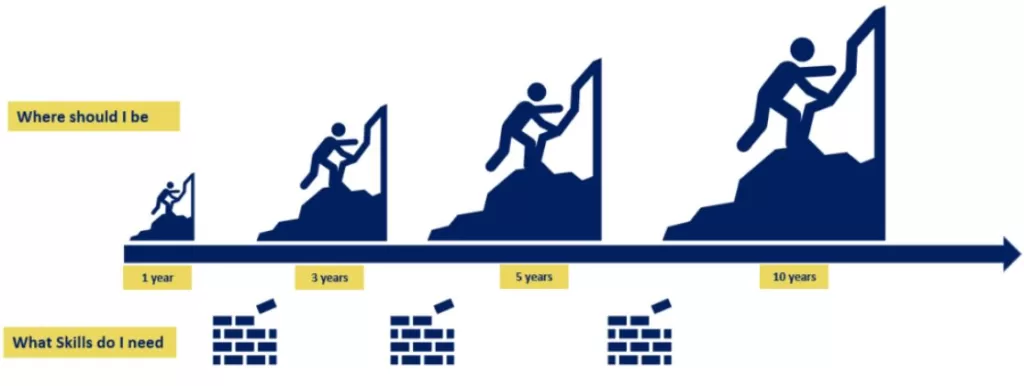
Key takeaways from this post – Career Aspirations Examples
- This is an important questions for hiring managers as it provides insight into your long-term goals and compatibility with the company.
- Choose a response that shows progress in either personal or professional context
- Be specific and realistic and keep it contextual to the company and job description.
- Show enthusiasm and passion for your career path, using positive language and demonstrating your commitment to continuous learning and growth.
- Avoid clichés and vague responses. Strike a balance between confidence and humility.
- Use the Career Aspirations Examples here for inspiration only. Remember, authenticity is key.
Here’s a video version
As you prepare for your next job interview, it’s important to anticipate the types of questions you may be asked and think about how you will respond. One common question that often comes up is “What are your career aspirations?” While this may seem like a simple question, it’s actually a very important one for hiring managers to ask.
Here are some helpful job interview related blogs
- Tackling the final interview round
- How to answer ‘tell me about yourself’
- What are your career aspirations
- Why do you want this job
- Why should we hire you
- Why are you leaving your job
- What are you passionate about
- Strengths and Weaknesses In Interview
- Interview questions for managers
- What is your management style
- Interview questions for freshers
- Tips to succeed in a job interview
- Types of interview questions
- Interview questions to ask candidates
- Behavioural interview questions
- Walk me through your resume
- What makes you unique
- What are your goals
- How do you handle stress and pressure
- Are you a team player
- How did you hear about this position
- Where do you see yourself in five years
- How do you handle stakeholders
Why hiring managers ask about your career aspirations
Your career aspirations are an important factor for hiring managers to consider when evaluating your fit for the role and the company. Why?
Insight into your long-term Objectives: Your aspirations provide insights into how you envision a future within the company. It always works in your favor if your hiring hiring managers think of you as a long term investment.
Alignment with Company Culture: Your aspirations also might help the hiring manager understand how your values and motivations align with the company’s mission and culture.
Work Ethic and Motivation: Aspirations focused on making a positive impact reflect a strong work ethic and a purpose-driven approach. In contrast, goals primarily centered on financial gains might raise concerns about you being narrow-focused.
Self-awareness: A candidate who has thought-through their career has a better chance of succeeding than someone who has no idea on where they want to be. If you cannot plan your own future, how are you going to plan something else.
Here’s a video version of this blog.
Different kinds of career aspirations

Career aspirations come in all shapes and sizes. Here are a few that you might relate with.
Owning a Business: Everyone wants to run their own business one day, no shock there. Yes, they are in a job interview planning to work for another company, but show respect when they share their aspirations.
Tip to hiring managers: The candidate might want to build another Amazon or start a personal chef business – it is their aspiration, not yours! And try not to use it as a measure of how well they can succeed at your company.
Becoming an Expert: Some aspire to gain deep knowledge and expertise in a specific field or subject, becoming a go-to authority. In many cases, an expert is paid better than the manager he reports to. This also paves the door for (highly paid) consultant roles.
Executive Positions (with power): Some aspire towards high-level leadership roles such as CEO or CFO, overseeing significant organizational aspects. Watch out for them, they might become your manager someday.
Becoming a Leader: Some seek that are geared towards coaching and inspiring teams, focusing on leadership and people management. They seek influence without the power, they are a rare breed.
Career Switch: Some might want to pivot to a completely different career path, seeking new challenges and learning opportunities.
Earning a New Degree: Some (especially younger employees) might want to pursue advanced education to enhance skills and qualifications, facilitating career advancement or change.
Of course, the list is much longer. But these flavors are to help you identify your career aspirations category better.
Crafting the perfect response to ‘What are your career aspirations’
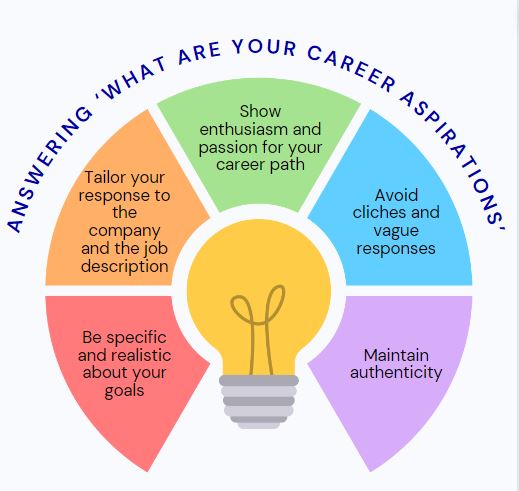
Be specific and realistic about your goals
It’s important to have a clear and specific idea of what you want to achieve in your career. This could be a specific position or role, a certain level of responsibility or authority, or a particular industry or company you want to work in.
However, it’s also important to be realistic about your goals. Don’t set your sights too high or make promises that you can’t keep. It’s better to have achievable goals that you can work towards rather than setting yourself up for disappointment.
For example, instead of saying “I want to be the CEO of a Fortune 500 company,” try saying “I am interested in eventually moving into a leadership role within the company, where I can use my skills and experience to help drive growth and success.” This shows ambition and drive, but is also realistic and achievable.
Tailor your response to the company and the job description
Your career aspirations should be relevant to the company and the job you are applying for. This shows that you have done your research and are interested in being a part of the company’s mission and culture.
For example, if you are applying for a marketing / product role at a sustainability-focused company, you could say “I am passionate about using my marketing skills to promote environmentally-friendly products and services, and I see this role as a chance to make a positive impact in that area.”
This shows that you align with the company’s values and are motivated to contribute to their mission.
Show enthusiasm and passion for your career path
Employers want to hire candidates who are passionate and enthusiastic about their work. If you are excited about your career goals and can show that through your words and body language, it can make a strong impression on the hiring manager.
Try to use positive language and avoid negativity or hesitation when discussing your goals. For example, instead of saying “I’m not sure what I want to do, but I’ll figure it out eventually,” try saying “I am committed to continuous learning and personal development, and I see this role as an opportunity to expand my skillset and advance my career.”
This shows motivation and a proactive approach to your career.
Avoid cliches and vague responses
It’s important to be original and authentic in your response to the question of your career aspirations. Avoid using clichés or vague responses like “I want to be successful” or “I want to climb the corporate ladder.” These are too general and don’t reveal much about your specific goals or motivations.
Instead, try to be specific and concrete in your response. Use examples and anecdotes to illustrate your goals and why they are important to you. This will help the hiring manager understand your aspirations on a deeper level and why you are a good fit for the role.
Common pitfalls when explaining your career aspirations
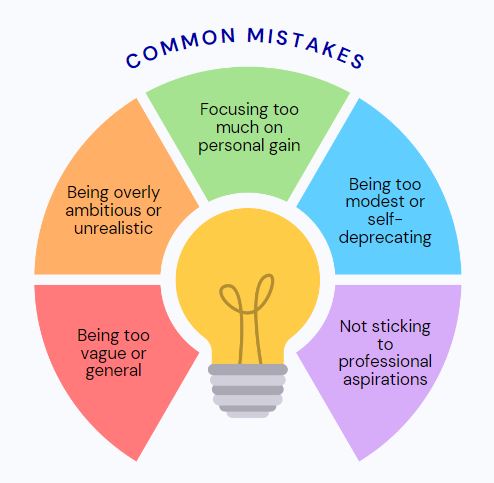
Being too vague or general
It’s important to be specific and concrete in your response to the question of your career aspirations. Vague or general responses like “I want to be successful” or “I want to do something meaningful” don’t give the hiring manager a clear idea of what you want to achieve or how you see yourself fitting into the company.
Instead, try to be specific and use examples to illustrate your goals related to your Professional life. For example, instead of saying “I want to do something meaningful,” try saying “I am passionate about using my skills and knowledge to make a positive impact in the world, and I see this role as a stepping stone towards achieving that goal.”
This shows your motivations and how you see yourself fitting into the company’s mission.
Being overly ambitious or unrealistic
While it’s important to be ambitious and have big goals, it’s also important to be realistic. Setting unrealistic goals or making grandiose promises can raise red flags for the hiring manager and make you seem untrustworthy or naïve.
For example, if you are just starting your career and you say that you want to be the CEO of a Fortune 500 company within 5 years, it may seem unrealistic and overambitious. Instead, try setting smaller, achievable goals that will help you build a strong foundation for your career and give you the skills and experience you need to eventually reach your long-term aspirations.
Focusing too much on personal gain
It’s important to show that you are motivated and driven, but it’s also important to show that you are a team player and are interested in contributing to the company’s success. If you focus too much on personal gain and make it seem like you only care about your own career advancement, it may raise red flags for the hiring manager.
Instead, try to focus on how your goals align with the company’s mission and values, and how you see yourself contributing to the company’s success. For example, instead of saying “I want to make a lot of money,” try saying “I am ambitious and driven, and I see this role as a chance to learn and grow, with the goal of eventually taking on more responsibility and leadership within the company.”
This shows that you are motivated and ambitious, but also that you are committed to the company and its success.
Being too modest or self-deprecating
While it’s important to be humble, it’s also important to show confidence and belief in your abilities and goals. If you are too modest or self-deprecating, it can make you seem uncertain or unconfident, which can be a turn-off for hiring managers.
Instead, try to strike a balance between modesty and confidence. Show that you are aware of your strengths and skills, and explain how you plan to use them to achieve your goals. For example, instead of saying “I’m not sure if I’m qualified for this role,” try saying “I believe that my skills and experience make me a strong fit for this role, and I am excited about the opportunity to contribute to the company’s success.”
This shows confidence in your abilities and a proactive approach to your career.
Stick to professional aspirations
While it may be tempting to include personal goals or personal aspirations in your response, it’s best to stick to professional ones. This is especially important if you are early in your career or are applying for a job that is not directly related to your personal goals.
Instead, focus on professional development that fit with the role and company. For example, instead of saying “I want to travel the world,” try saying “I am passionate about learning new cultures and seeing the world, and I see this role as a great opportunity to gain experience in the field and build my skills.” This shows that your professional aspirations are in line with the role and company, as well as your personal goals.
If you want to run your own business one day, talk about it only if you are applying for a role at an early-stage startup. Otherwise, focus on more relevant professional goals and aspirations that will help you contribute to the company’s success.
Career Aspirations Examples – How To Answer “What are your career aspirations?” in your next interview
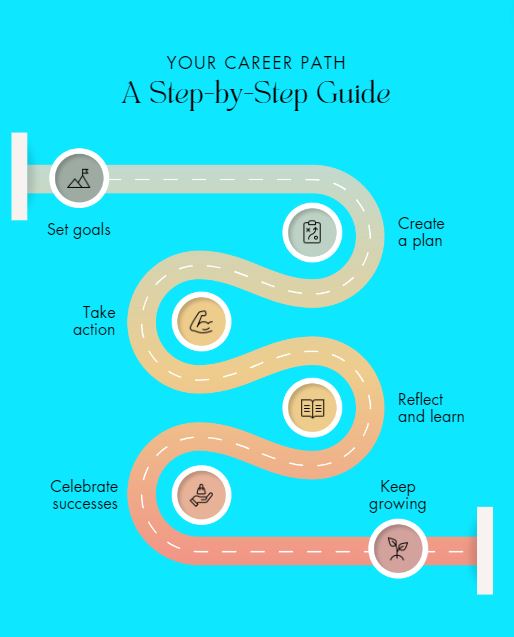
Please use these Career Aspirations Examples / sample career aspirations answer is for your inspiration only. I’m a hiring manager and can easily sense when a someone just googled ‘career aspirations sample answers’ and gives a canned or copied and pasted response. Hire a coach if you need help – being authentic is more important than sounding sophisticated,.
Marketing
As I embark on this journey with your company, I am eager to combine my creative and analytical strengths in order to craft triumphant marketing strategies. This role is an exceptional chance for me to grow as a professional while simultaneously training for a leadership position within the marketing division.
Software development
I am eager to utilize my technical proficiency and analytical skills in order to create cutting-edge software solutions for the organization. This position is a grand opportunity for me, allowing me to learn and develop myself with an ultimate aim of progressing into a leading role within the development team.
I’m passionate about lifelong learning and progress, so I view this job as a means of honing my software development skillset while furthering my career. Ultimately, I aspire to fill a specialized position where I am able to leverage my proficiency for the benefit of the company.
In addition, before stepping into this industry, consider reviewing internship opportunities to software engineers.
Customer service
“I am excited about the opportunity to start my career in customer service and learn from experienced professionals. I see this role as a chance to learn and grow, with the goal of eventually transitioning into a leadership position within the customer service department.”
Sales
“I am passionate about helping clients achieve their goals and find solutions, and I see this role as an opportunity to use my sales skills and customer service expertise to make a positive impact on the company and its clients. I hope to eventually move into a specialized role where I can use my skills and experience to drive long-term success for the company.”
Human resources
“I am excited about the opportunity to use my skills and experience to support and develop the company’s employees. I see this role as a chance to learn and grow, with the goal of eventually transitioning into a leadership position within the HR department.”
Entry-level roles
“I am excited about the opportunity to start my career with a company that values growth and development. I see this role as a chance to learn and build a strong foundation for my future with the company.”
“I am eager to learn and contribute to the success of the company, and I see this role as an opportunity to gain valuable skills and experience that will help me achieve my long-term career goals.”
Mid-level roles
“I am excited about the opportunity to use my skills and experience to contribute to the success of the company and take on more responsibility. I see this role as a chance to learn and grow, with the goal of eventually transitioning into a leadership position within the company.”
“I am ambitious and driven, and I see this role as an opportunity to use my skills and expertise to make a meaningful contribution to the company. I hope to eventually move into a specialized role where I can use my skills and experience to make a significant impact.”
Career aspirations for freshers – example answers

Gaining Industry Experience: My aim is to enhance my knowledge in the practical aspects of XYZ field, bridging the gap between academic knowledge and real-world applications. I know being an expert will only help regardless of what I want to do next.
Skill Development towards teamwork: I see myself growing highly dynamic team environments, and thrive in a high-energy environment where I can always contribute and support. I would like to enhance my skills around teamwork, communication and problem solving. It would be great to apply my engineering skills and problem solving ability towards helping my team advance on their goals.
Exploring Various Roles: I’m open to experimenting with different roles or internships. This exploration will help me find my true passion and understand where my strengths can be best utilized.
Achieving a Master’s Degree or Professional Certification (use this only if you think you have the opportunity to do it with the company you are interviewing for): I aspire to further my education or obtain relevant certifications. These qualifications will provide me with a competitive edge and deepen my understanding of my field.
Earning a Leadership Role: I have always loved taking responsibilities. My long-term goal is to secure a leadership position where I can lead projects or teams. I aim to make impactful contributions and drive positive changes.
Career Aspirations for Leadership Roles – Examples
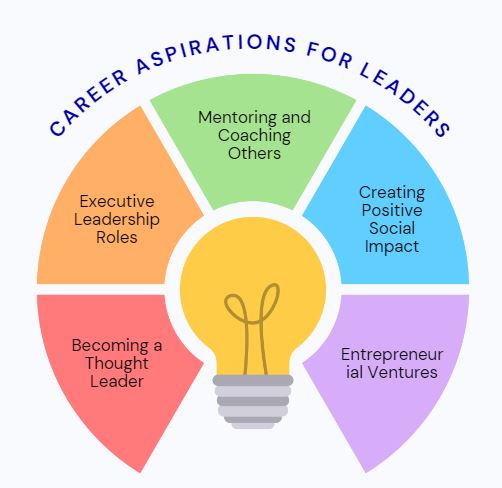
Here are some inspirations for people interviewing for leadership positions.
Becoming a Thought Leader in Your Industry: I would like to be recognized as an expert in XYZ field, influence trends and become a well-known though leader. Often times, people with a lot of expertise become cocooned in their organization while their knowledge and expertise could help shape the future. I consider that as a win-win when I can be the face of an organization influencing changed in the industry.
Executive Leadership Roles: I aspire to grow into senior management positions like CEO, CFO, or CTO, where I can shape the direction and success of an organization. Often times the bureaucracy associated with large organizations can hinder growth, and with my change/growth/XYZ mindset, I believe I can make a difference with a formal title to go with it.
Entrepreneurial Ventures: I dream of starting my own business or leading a startup, and influence the direction of this product/technology. I also bring my entrepreneurial spirt into the role here and help the team think in a direction that might be unconventional, but yields sustainable results.
Developing a Strong Professional Network (and/or) Mentoring and Coaching Others: I would like to focus on building a network of influential professionals and mentors to open doors to new opportunities and collaborations. I have been helped by many kind people over my career and I would like to pay it back. I also aim to develop future leaders by sharing my knowledge and experience through mentorship or coaching roles.
Creating Positive Social Impact: I strive to lead initiatives that contribute to societal good, aligning my career goals with broader social objectives. I’m not sure what roles, but more likely in leadership positions in non-profit organizations that are aligned towards XYZ cause.
Global Leadership Experience: I seek opportunities to work internationally or manage cross-cultural teams, enhancing my global leadership experience. I have also loved learning about new cultures, especially while playing influential roles allowing me the opportunity to learn and teach at the same time.
Career Goals vs Career Aspiration vs Career Path
| Aspect | Career Goals | Career Aspirations | Career Path |
|---|---|---|---|
| Definition | Specific, measurable, achievable, relevant, and time-bound objectives in a career. | Long-term professional dreams or visions, often less tangible and specific than goals. | The sequence of jobs, experiences, and education taken to reach career goals and aspirations. |
| Nature | Concrete, detailed, and often short-term or medium-term. | Broader, more abstract, and long-term. | A combination of practical steps, experiences, and education. |
| Examples | Completing a certification, landing a promotion, transitioning into a leadership role, starting a business in a specific timeframe. | Becoming an expert in a field, making a positive impact, pursuing leadership roles, changing industries, achieving work-life balance, working abroad. | Progression in a specific industry, types of jobs held, skills and knowledge acquired. |
| Purpose | To provide specific targets and milestones in one’s career. | To give a general direction and purpose to one’s career. | To outline the practical journey towards achieving career goals and aspirations. |
| Flexibility | Generally more rigid and specific. | More flexible and adaptable to change. | Can vary greatly depending on opportunities and decisions made along the way. |
| Timeframe | Often set with a specific deadline or timeline. | Usually envisioned over a longer, indefinite period. | Spans the entire career, varying as goals and aspirations evolve. |
| Measurement | Easier to measure success (e.g., obtaining a degree, getting a promotion). | Harder to quantify as it’s about personal fulfillment and broader impact. | Measured by the progression and transitions in jobs, roles, and learning. |
| Alignment with Personal Values | May or may not align closely with personal values, more focused on professional milestones. | Strongly aligned with personal values and inner vision. | Reflects a combination of personal values, opportunities, and professional objectives. |
Understanding the Trio: Career Goals, Aspirations, and Paths
What Sets Apart Career Goals, Aspirations, and Career Path?
What are Career Goals: These are specific, achievable, and time-bound objectives you set in your professional journey. Career goals can range from short-term targets like completing a course to long-term aims like stepping into a leadership role or launching your own venture.
What are Career Aspirations: These are your broader, long-term professional dreams. They might be less defined than career goals but serve as a guiding star for your career direction. Career aspirations are about the journey and the growth needed to get there, such as acquiring leadership skills to manage a large team. The key is authenticity, not just impressing potential employers.
What is Career Path: This is the journey you embark on to reach your career goals and aspirations. It includes the jobs you take, the experiences you gain, and the education you pursue. Remember, there can be multiple paths leading to the same aspiration, as long as you’re clear about your end goal.
Career Goals Examples:
- Earning a specific certification or degree
- Achieving a promotion or a particular job title
- Increasing your salary or earning a raise
- Starting your own business within a defined timeframe
- Moving into a leadership role in a set period
- Enhancing or acquiring certain skills by a deadline
- Expanding your professional network in your industry
Career Aspirations/Ambitions Examples:
- Gaining expertise in your field
- Creating a positive impact in your industry or community
- Embarking on entrepreneurship
- Aiming for a leadership or executive position
- Switching industries or career paths
- Striving for work-life balance
- Pursuing opportunities to travel and work abroad
Here’s some helpful career/leadership related blogs
- Do you need an Career coach / Interview coach?
- Careers– Agile Coach, RTE, Product Owner, Scrum Master, QA Manager
- Career development plan
- Career growth
- Project Management
- Managing Managers
- IT Career switch
- Software Engineering career path
- Agility, Agile Testing
- Remote leadership / Leadership traits / Agile leadership
Other Productivity / Tools posts that may interest you
- Productivity
- Book summary apps – Headway App vs Blinkist vs getAbstract
- AI Writers: / Blogging – Jasper, Writesonic, Article Forge , Copy AI, Anyword, Writecream, Copymatic, Quillbot, Peppertype, Jasper AI (pricing) &
- Work From Home tools: Jabra
About the author: Ilam’s career in Technology and Financial Services spans more than two decades, characterized by leadership roles and vast international experience. He has managed large global teams, worked across five countries, and engaged with colleagues from over 100 nationalities. Through this blog, Ilam shares his diverse experiences and insights, aiming to contribute to and enrich the community.





